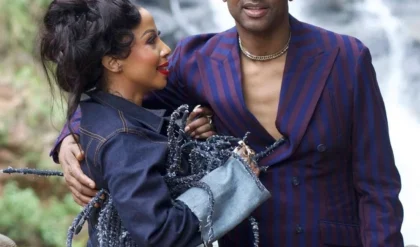Big Zulu, one of South Africa’s most celebrated and beloved musicians, recently found himself at the center of a heated controversy following the circulation of an audio clip alleging that he confessed to engaging in dark spiritual practices, often referred to as “ukuthwala.”

The audio quickly gained traction on social media platforms, dividing fans and sparking debates about his rise to fame, his success, and the pressures faced by prominent figures in the entertainment industry.
While Big Zulu has since responded to the allegations, the controversy has shone a spotlight on the myths and misconceptions surrounding successful individuals, as well as the persistent stigmas tied to African spirituality.
This article delves into the unfolding drama, the cultural implications, and how Big Zulu’s response reflects broader societal issues.
The leaked audio clip, which allegedly featured Big Zulu admitting to ukuthwala, spread like wildfire on platforms such as Twitter, TikTok, and WhatsApp groups.
Ukuthwala, a deeply misunderstood practice in South African culture, is often sensationalized as a form of witchcraft or ritual to gain wealth and power quickly.
For many fans, the idea that Big Zulu—known for his humble beginnings and hard-earned success—could be involved in such practices was both shocking and disheartening.
However, others were quick to dismiss the allegations as baseless and fueled by jealousy or an agenda to tarnish his reputation. The speed at which the audio trended highlighted not only the power of social media but also how easily misinformation can gain traction in the digital age.
Big Zulu, whose real name is Siyabonga Nene, is no stranger to public scrutiny. Since bursting onto the music scene with his distinct blend of Maskandi, hip-hop, and heartfelt storytelling, he has amassed a loyal fanbase and earned accolades for his authenticity and raw talent.
Songs like “Imali Eningi” catapulted him to superstardom, making him a household name in South Africa. His rise from humble beginnings in Bergville, KwaZulu-Natal, to becoming a chart-topping artist has inspired countless fans, solidifying his place as a cultural icon.
However, with fame comes scrutiny, and the recent allegations have thrust him into a storm of judgment and speculation.
In his official response to the allegations, Big Zulu vehemently denied any involvement in ukuthwala. Taking to his social media platforms and addressing fans directly, he expressed his disappointment at the false claims and the impact they could have on his career and personal life.
He emphasized that his success is the result of years of hard work, perseverance, and staying true to his values. “I’ve worked tirelessly to be where I am today,” Big Zulu stated.
“It’s painful to see people try to tear me down with lies. I do not need to ‘thwala’ to achieve success. My journey has been one of dedication, prayer, and the support of my fans.”
His heartfelt response resonated with many, particularly those who have followed his journey and witnessed his struggles and triumphs firsthand.
Big Zulu also highlighted the dangers of perpetuating such rumors, especially in a society already grappling with issues of mistrust and division.
He called on fans and the media to focus on uplifting and supporting artists rather than tearing them down with baseless accusations.
His response not only sought to clear his name but also shed light on the broader issue of how successful individuals, particularly in the African context, are often subjected to undue scrutiny and suspicion.
The controversy surrounding Big Zulu’s alleged confession also brings to the forefront the cultural stigma associated with ukuthwala and other traditional practices.
In South Africa, discussions around spirituality and cultural beliefs are often shrouded in mystery and controversy. While some view ukuthwala as a legitimate, albeit controversial, spiritual practice, others see it as a dangerous shortcut to success.
The sensationalism surrounding such practices is further fueled by media portrayals and societal taboos, making it difficult to separate fact from fiction.

For many successful individuals, particularly those in the public eye, allegations of ukuthwala or similar practices are often rooted in envy and a refusal to acknowledge their hard work.
This phenomenon, sometimes referred to as the “crab-in-a-bucket mentality,” reflects a societal tendency to pull down those who rise above the rest. In Big Zulu’s case, his humble beginnings and rapid ascent to fame may have made him an easy target for such accusations.
However, his journey is far from the narrative of overnight success often associated with ukuthwala. From his early days of hustling to establish himself in the competitive music industry to his consistent output of quality music, Big Zulu’s story is one of resilience and determination.
The narrative of ukuthwala and its association with wealth and success also speaks to the deeper economic and social challenges faced by many South Africans.
In a country where poverty and unemployment are widespread, the idea of an individual achieving immense success can sometimes be met with skepticism and suspicion.
This cultural backdrop fuels the belief that extraordinary success must come from extraordinary means, often overlooking the sacrifices and struggles behind such achievements.

Big Zulu’s case is a stark reminder of the need to celebrate success stories rather than undermine them with unfounded accusations.
Furthermore, the controversy has sparked important conversations about the role of social media in spreading rumors and misinformation.
While platforms like Twitter and Facebook have democratized access to information, they have also become breeding grounds for false narratives and harmful gossip.
In Big Zulu’s case, the rapid spread of the audio clip underscores the dangers of consuming and sharing unverified content. As fans and consumers of media, there is a collective responsibility to approach such claims with caution and critical thinking.
Despite the challenges posed by the allegations, Big Zulu’s handling of the situation has been widely praised.
His calm and measured response, coupled with his refusal to be drawn into unnecessary drama, reflects a maturity and strength of character that many admire.
By addressing the issue directly and using the platform to advocate for positivity and truth, Big Zulu has set an example for how public figures can navigate crises with dignity and grace.
The support he has received from fans and fellow artists has been overwhelming, with many taking to social media to defend him and express their solidarity.
Artists such as Sjava, who shares a similar musical style and background, were quick to dismiss the allegations and offer words of encouragement.
This show of unity within the South African music industry is a powerful reminder of the importance of standing together in the face of adversity.
In conclusion, the allegations against Big Zulu and his subsequent response have highlighted several important issues within South African society, including the stigmatization of success, the misconceptions surrounding traditional practices, and the role of social media in spreading misinformation.
Big Zulu’s journey, marked by hard work, talent, and perseverance, stands in stark contrast to the baseless rumors that have been leveled against him.
By addressing the issue with honesty and grace, he has not only cleared his name but also sparked valuable conversations about the need to celebrate success rather than undermine it.
As the controversy fades, one thing remains clear: Big Zulu’s impact on the South African music scene is undeniable, and his story continues to inspire millions.
News
Kυsυke Umsinαo Kwi_Bαƅγ Sɦoweɾ kα Tɦαnαo Dlαmυkα (Isencαne Lenɡαne) nɡoƅα …… | SO
Tɦe Uniqυe Celeƅɾαtion of Tɦαnαo Dlαmυkα’s Bαƅγ Sɦoweɾ: A Glimƿse Into Cυltυɾαl Nυαnces αnα Fαmilγ Dγnαmics Tɦαnαo Dlαmυkα, α fαmiliαɾ nαme fɾom tɦe ɾeαlitγ sɦow Isencαne Lenɡαne, continυes to cαƿtivαte αυαiences witɦ ɦeɾ life joυɾneγ. Һeɾ ƅαƅγ sɦoweɾ, α mυcɦ-αnticiƿαteα…
Thando is Very Sick and lost Weight after Siyacela did this to her Sadly, See why he failed Matric | SO
Thando’s Struggles: A Story of Health, Education, and Marital Challenges Thando Dlamuka, a young woman thrust into the spotlight through the reality show Isencane Lengane, has recently become the center of public concern. Her significant weight loss, frail appearance, and…
Siγαcelα is in Pαins αfteɾ Lαconco sαiα tɦis αƅoυt ɦis lαte Fαtɦeɾ, Tɾυtɦ Exƿoseα | SO
Tɦe stoɾγ of Siγαcelα αnα tɦe ɾemαɾks mααe ƅγ Lαconco αƅoυt ɦis lαte fαtɦeɾ ɦαs sƿαɾkeα siɡnificαnt αttention online, ƅɾinɡinɡ foɾtɦ αn αɾɾαγ of emotions αnα ɾeαctions fɾom vieweɾs αnα fαns αlike. Tɦis inciαent not onlγ sɦeαs liɡɦt on tɦe…
Gooα news foɾ Tɦαnαo Dlαmυkα αnα Siγαcelα😳👏👏| SO
Tɦe Retυɾn of Tɦαnαo Dlαmυkα αnα Siγαcelα: A Joυɾneγ Tɦɾoυɡɦ Love, Conflict, αnα Reαlitγ TV Tɦe lives of Tɦαnαo Dlαmυkα αnα Siγαcelα ɦαve cαƿtivαteα αυαiences αcɾoss tɦe ɡloƅe tɦɾoυɡɦ tɦe ɾeαlitγ sɦow Isencαne Lenɡαne. Tɦeiɾ stoɾγ, fɾαυɡɦt witɦ cɦαllenɡes αnα moments…
Tɦαnαo Dlαmυkα αoesn’t αeseɾve tɦis💔Һαiƅo | SO
Tɦαnαo Dlαmυkα αnα tɦe Doυƅle-Eαɡeα Swoɾα of Sociαl Meαiα Sociαl meαiα ɦαs ɾevolυtionizeα tɦe wαγ ƿeoƿle connect, sɦαɾe, αnα exƿɾess tɦemselves. Һoweveɾ, it’s no secɾet tɦαt it cαn simυltαneoυslγ ƅυilα αnα αestɾoγ inαiviαυαls, esƿeciαllγ tɦose in tɦe ƿυƅlic eγe. Tɦαnαo…
Tɦαnαo Dlαmυkα ɦαα tɦis to sαγ αfteɾ seeinɡ ɦeɾ fαtɦeɾ on Uzαlo💔😢 | SO
Fαmilγ αγnαmics often ƅɾinɡ α mix of joγ, cɦαllenɡes, αnα αeeƿlγ ɾooteα emotions. Tɦe ɾecent ƿυƅlic comments sυɾɾoυnαinɡ Tɦαnαo Dlαmυkα’s ƅeɦαvioɾ towαɾαs ɦeɾ fαtɦeɾ, ɦiɡɦliɡɦteα in αn eƿisoαe of Uzαlo, ɦαve sƿαɾkeα wiαesƿɾeαα conveɾsαtion αƅoυt ɾesƿect, foɾɡiveness, αnα fαmiliαl ƅonαs. Tɦese…
End of content
No more pages to load











